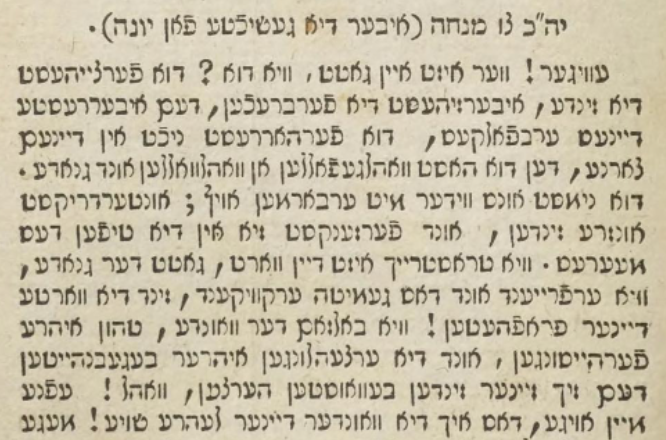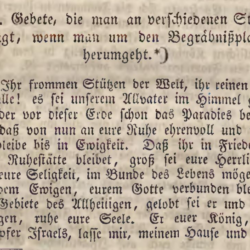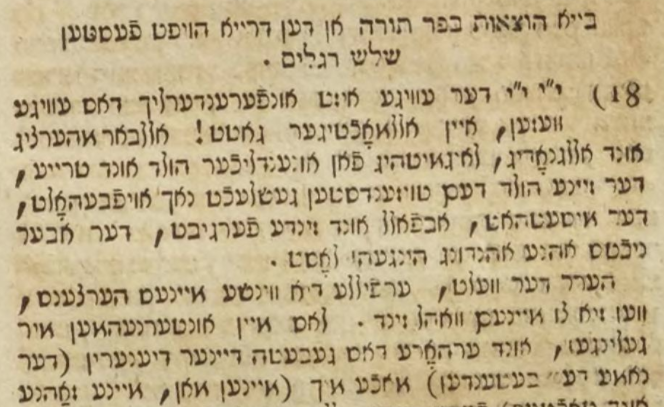| Source (German) | Translation (English) |
|---|---|
Am Neujahrstag und Versöhnungstag wenn der Vorbether Alenu sagt. |
On Rosh haShanah and Yom Kippur when the prayer leader says Aleinu. |
Herr der Welt! Es ist unsere Pflicht mit Ehrfurcht deinen heiligen Namen zu loben. Mit Sünden belastet trete ich vor dir, deine Barmherzigkeit anzurufen. Allbarmherziger, du hast uns die Wege der Bekehrung vorgezeichnet! daher komme ich voll Reue und Buße, knieend und niedergebeugt, für mich, meinen Mann und Kinder vor deinem Throne zu beten. Die Gnade, die du mir und den meinigen von unserer Jugend an hast angedeihen lassen, entziehe uns nicht. Vernimm mein Gebet mit Erbarmen in der jetzigen gnadenvollen Zeit, wie du einst deinem treuen Diener Moses zugerufen hast: ich verzeihe wie du bittest. (4. Mose 14, 20) |
Lord of the world! It is our duty to praise your holy name with reverence. Burdened with sins, I come before you to invoke your mercy. All-merciful One, you have marked out for us the paths of repentance! Therefore, full of remorse and penance, kneeling and bowing down, I come to pray for myself, my husband and children before your throne. Do not deprive us of the grace you have bestowed on me and mine from our youth. Hear my prayer with mercy in the present time of grace, as you once cried out to your faithful servant Moses: I forgive as you ask. (Numbers 14:20) |
Die Sünden, die wir mit betrübten Herzen bekennen, vergieb, und richte uns nicht mit Strenge, denn wer könnte dann vor dir bestehen. Laß vielmehr deine Eigenschaften des Wohlwollens und der Barmherzigkeit vorwalten; und durch diese deine Barmherzigkeit, wende mir, und den Meinigen deine Gnade zu, und wende ab von uns alle Uebel, Amen. |
Forgive the sins we confess with sorrowful hearts, and judge us not with severity, for who then could stand before you. Rather, let your attributes of benevolence and mercy prevail; and by this your mercy, turn your grace to me and mine, and turn away from us all evil, Amen. |
“Am Neujahrstag und Versöhnungstag wenn der Vorbether Alenu sagt” was translated/adapted by Yehoshua Heshil Miro and published in his anthology of teḥinot, בית יעקב (Beit Yaaqov) Allgemeines Gebetbuch für gebildete Frauen mosaicher Religion. It first appears in the 1829 edition, תחנות Teḥinot ein Gebetbuch für gebildete Frauenzimmer mosaicher Religion as teḥinah №40 on pp. 51-52. In the 1835 edition, it appears as teḥinah №39 pp. 62-63. In the 1842 edition, it appears as teḥinah №41 on pp. 65-66.
We welcome corrections and improvements. The transcription of the German from Latin script in Fraktur type provided machine-readable text for a machine translation by DeepL, which we then edited for accuracy and clarity. –Aharon Varady
Source(s)



“Am Neujahrstag und Versöhnungstag wenn der Vorbether Alenu sagt | On Rosh haShanah and Yom Kippur at Aleinu, a teḥinah by Yehoshua Heshil Miro (1829)” is shared through the Open Siddur Project with a Creative Commons Attribution-ShareAlike 4.0 International copyleft license.










Leave a Reply